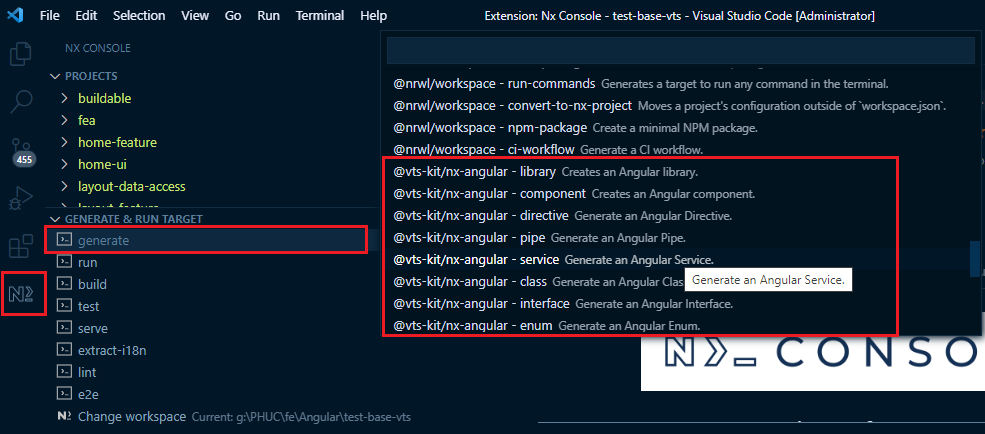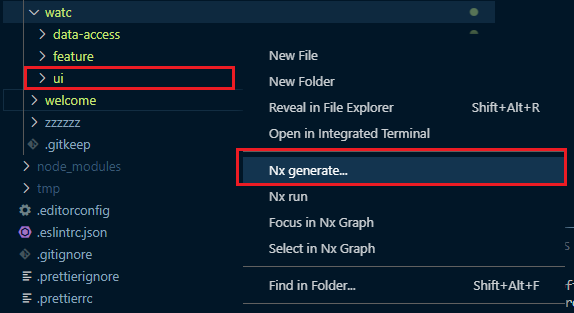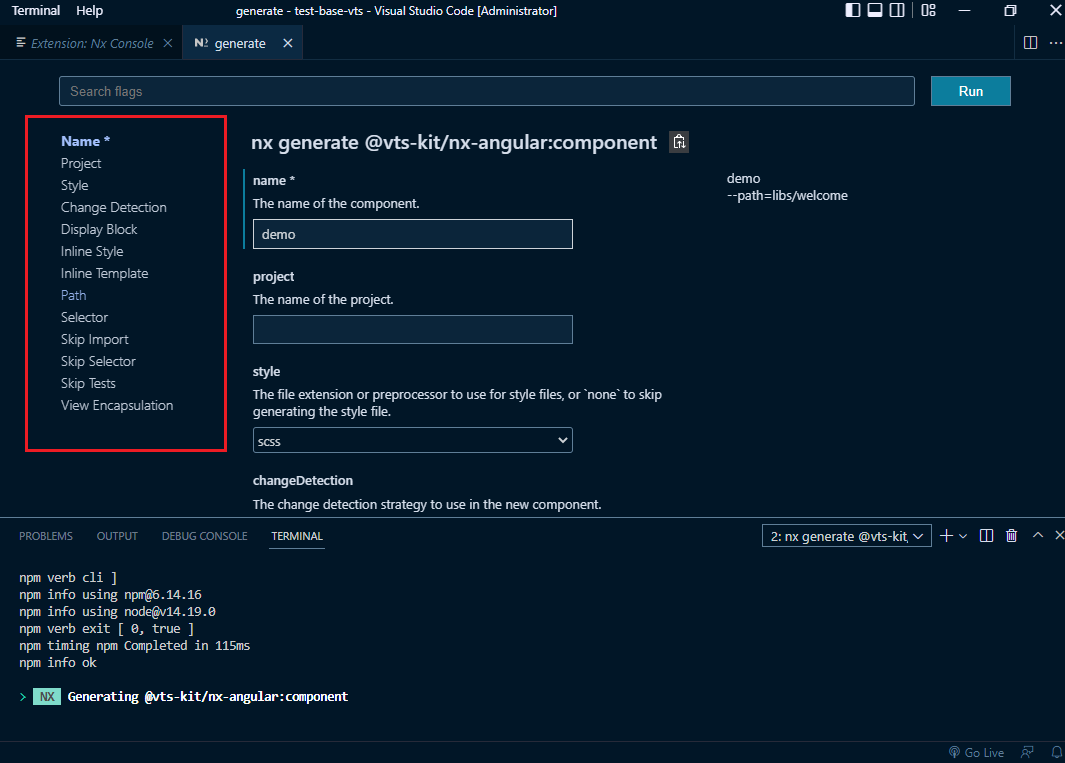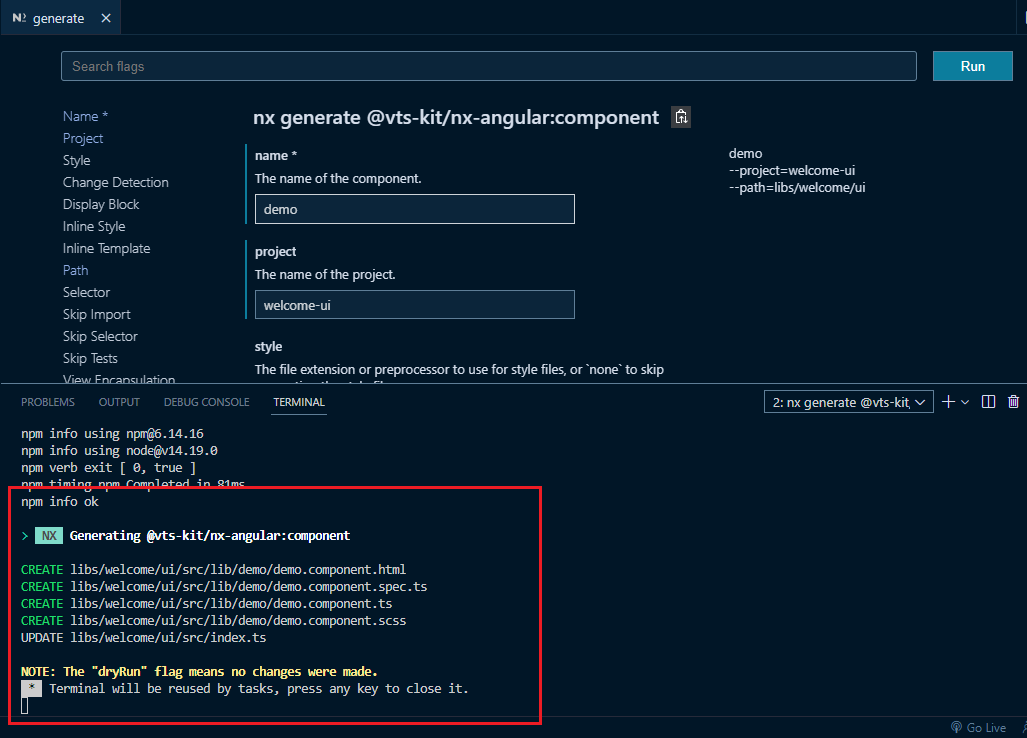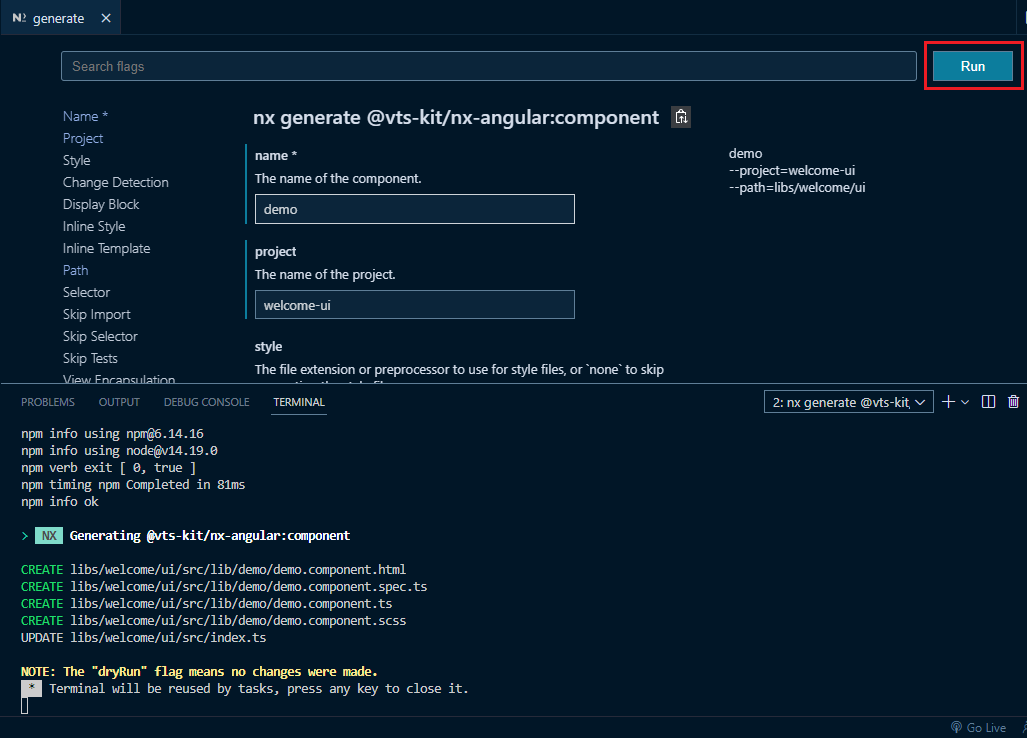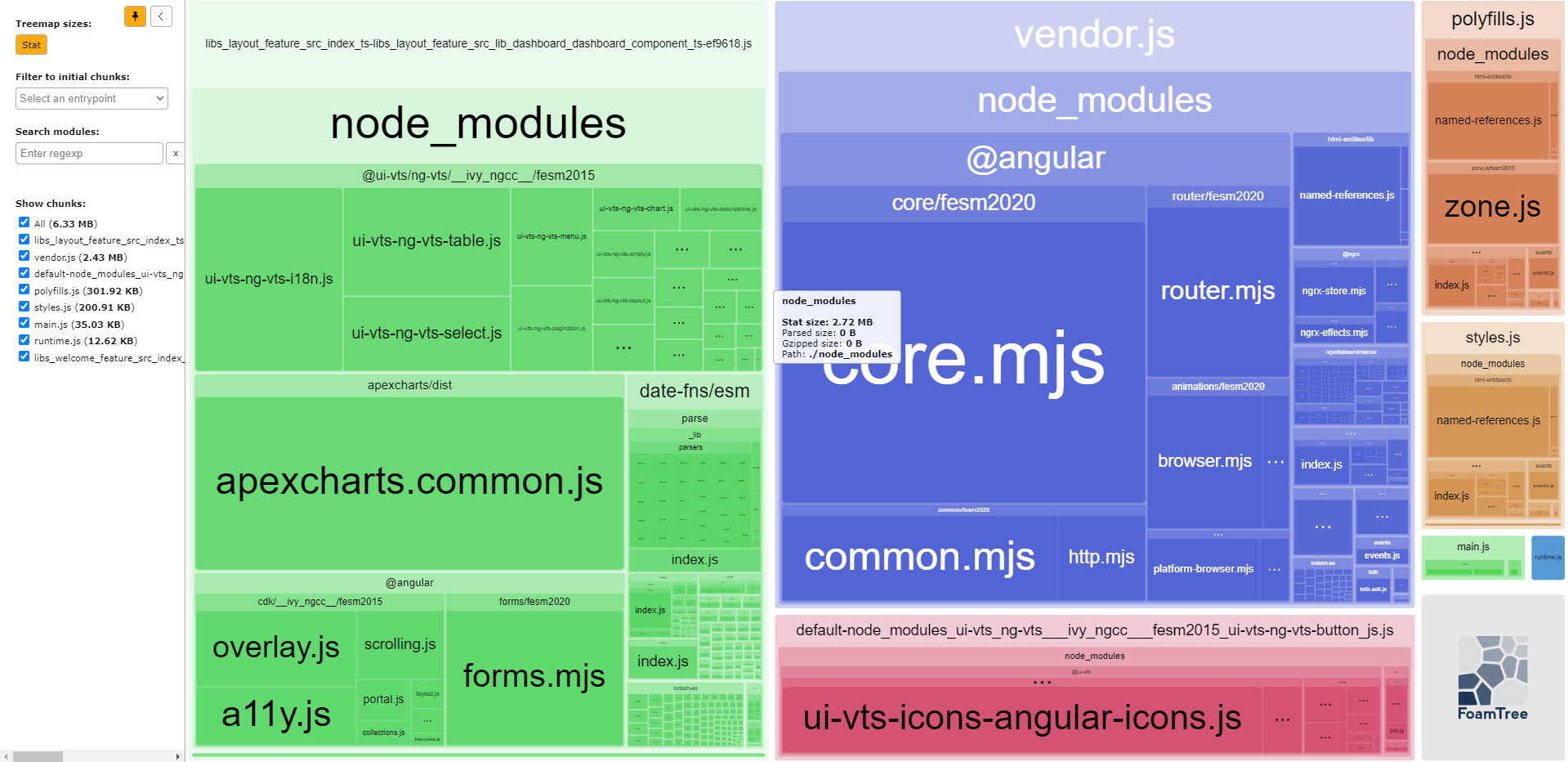VTS Kit Angular NX Plugin
VTS Kit Angular NX Plugin is a collection of generators to be integrated with Nx Workspace. This library aims to provide a quick way to start a new Angular Project and maintain code structure with least effort.
Requirement
- Node: 12+
- Npm: 6+ (included in Node installation)
- Npx: 6+ (included in Node installation)
Intergrated Features
- Custom Webpack (Guideline)
- UI Component: VTS UI Kit (Guideline + Home)
- Localization: @ngx-translate/core (Guideline + Git)
- Network Utilities: VTS Kit Angular Utilities (Guideline + Git)
- Validator Utilities: VTS Kit Angular Utilities (Guideline + Git)
- Common Utilities: VTS Kit Angular Common (Guideline + Git)
- Bundle Analyze: webpack-bundle-analyzer (Guideline + Git + NPM)
- CICD (Jenkin + Docker) intergrated (Guideline)
- Dynamic Environment (Guideline)
- 3rd party integration (Guideline + Git)
Quickstart
- Create a new workspace using VTS Kit Angular NX Plugin:
npx @vts-kit/nx-angular@latestStructure
.
└── <workspace_name>/
├── apps/
│ └── <app_name>/
│ ├── src/
│ │ ├── app/
│ │ │ ├── app.module.ts // Root component
│ │ │ ├── app.component.ts // Root component, bootstrap
│ │ │ ├── app.component.spec.ts // Root component, test
│ │ │ ├── app.component.html // Root component, outlet
│ │ │ ├── configs.ts // Provider, import configs
│ │ │ └── routes.ts // RouterModule config, lazy load to feature libraries
│ │ ├── assets/ // Public assets
│ │ │ └── locale/ // Translation dictionary
│ │ │ ├── en.json // JSON dictionary
│ │ │ └── vi.json // JSON dictionary
│ │ ├── environments/ // Environment config
│ │ | ├── environment.ts // Environment profile
│ │ | └── environment.prod.ts // Environment profile
│ │ └── styles/ // Global styles
│ ├── webpack/ // Webpack config
│ │ ├── webpack.config.js // Webpack profile
│ │ └── webpack.config.prod.js // Webpack profile
│ ├── project.json // Nx Project configuration
│ ├── tsconfig(.|lib|spec).json // Tsconfig
│ ├── favicon.ico // Angular starter files
│ ├── index.html // Angular starter files
│ ├── main.ts // Angular starter files
│ ├── polyfills.ts // Angular starter files
│ └── test.ts // Angular starter files
├── libs/ // Shared modules and feature modules
│ ├── layout/ // Feature group, layout
│ │ ├── ui/ // Library (generatable)
│ │ │ ├── src/
│ │ │ │ ├── index.ts // Automatically exporter on generating
│ │ │ │ └── lib/
│ │ │ │ ├── <topbar> // Standalone UI components, unit (generatable)
│ │ │ │ └── <sider> // Standalone UI components, unit (generatable)
│ │ │ ├── project.json // NX Project configuration
│ │ │ └── tsconfig(.|lib|spec).json // Tsconfig
│ │ ├── feature/ // Library (generatable)
│ │ │ ├── src/
│ │ │ │ ├── index.ts // Automatically exporter on generating
│ │ │ │ └── lib/
│ │ │ │ ├── <dasboard_layout> // Standalone UI components, container (ultilize units in template)
│ │ │ │ ├── <home_layout> // Standalone UI components, container (ultilize units in template)
│ │ │ │ ├── routes.ts // RouterModule config, lazy load
│ │ │ │ └── *.module.ts
│ │ │ ├── project.json // NX Project configuration
│ │ │ └── tsconfig(.|lib|spec).json // Tsconfig
│ │ └── data-access/ // Library (generatable)
│ │ ├── src/
│ │ │ ├── index.ts // Automatically exporter on generating
│ │ │ └── lib/
│ │ │ └── <store_1> // State management, store
│ │ ├── project.json // NX Project configuration
│ │ └── tsconfig(.|lib|spec).json // Tsconfig
│ ├── <feature_product>/ // Feature group (generatable)
│ │ ├── ui/ // Library (generatable)
│ │ │ ├── src/
│ │ │ │ ├── index.ts // Automatically exporter on generating
│ │ │ │ └── lib/
│ │ │ │ ├── <product_form> // Standalone UI components, unit (generatable)
│ │ │ │ └── <product_table> // Standalone UI components, unit (generatable)
│ │ │ ├── project.json // NX Project configuration
│ │ │ └── tsconfig(.|lib|spec).json // Tsconfig
│ │ ├── feature/ // Library (generatable)
│ │ │ ├── src/
│ │ │ │ ├── index.ts // Automatically exporter on generating
│ │ │ │ └── lib/
│ │ │ │ ├── <list_screen> // Standalone UI components, container (ultilize units in template)
│ │ │ │ ├── <detail_screen> // Standalone UI components, container (ultilize units in template)
│ │ │ │ ├── routes.ts // RouterModule config, lazy load
│ │ │ │ └── *.module.ts
│ │ │ ├── project.json // NX Project configuration
│ │ │ └── tsconfig(.|lib|spec).json // Tsconfig
│ │ └── data-access/ // Library (generatable)
│ │ ├── src/
│ │ │ ├── index.ts // Automatically exporter on generating
│ │ │ └── lib/
│ │ │ ├── <item_state> // State management, store
│ │ │ └── <filter_state> // State management, store
│ │ ├── project.json // NX Project configuration
│ │ └── tsconfig(.|lib|spec).json // Tsconfig
│ └── share/
│ └── guards/ // Library, publishable (generatable)
│ ├── interceptors/ // Library, publishable (generatable)
│ ├── data-access/ // Library, publishable (generatable)
│ ├── pipes/ // Library, publishable (generatable)
│ ├── services/ // Library, publishable (generatable)
│ ├── ui/ // Library, publishable (generatable)
│ ├── utils/ // Library, publishable (generatable)
│ └── validators/ // Library, publishable (generatable)
├── package.json
├── nx.json // NX Workspace configuration
└── tsconfig.base.json // Tsconfig, automatically update project alias
Using NX generators to generate necessary items and keep structure sync.
Generators
Schematics
| No | Name | Description |
|---|---|---|
| 1 | Library | Creates an Angular library. |
| 2 | Feature Group | Generate an Angular Feature group. |
| 3 | Component | Generate an Angular Component. |
| 4 | Directive | Generate an Angular Directive. |
| 5 | Pipe | Generate an Angular Pipe. |
| 6 | Service | Generate an Angular Service. |
| 7 | Class | Generate an Angular Class. |
| 8 | Interface | Generate an Angular Interface. |
| 9 | Enum | Generate an Angular Enum. |
| 10 | Guard | Generate an Angular Guard. |
| 11 | Interceptor | Generate an Angular Interceptor. |
| 12 | Resolver | Generate an Angular Resolver. |
| 13 | Validator | Generate an Angular Validator. |
| 14 | Template | Generate a feature group template. |
Usage
Using Nx CLI
- Make sure NX CLI has been installed.
npm i -g nx
- Using VTS Kit generators.
nx g @vts-kit/nx-angular:<generator_name> <generator_args>
Using Nx Console (GUI)
- Install Nx Console in VSCode
-
Using generator:
-
Fill in options
- Preview changes
- Press Run to make changes
Generator: Library
| No | Name | Description | Type | Require | Default |
|---|---|---|---|---|---|
| 1 | name | The name of the library. | string | ||
| 2 | directory | A directory where the library is placed. | string | false | |
| 3 | publishable | Generate a publishable library. Must specify importPath for other projects be able to import it. | boolean | false | |
| 4 | importPath | The library name used to import it, like @organize/lib-name. Must be a valid npm name. |
string | ||
| 5 | buildable | Generate a buildable library. | boolean | false | |
| 6 | skipPackageJson | Do not add dependencies to package.json. |
boolean | false | |
| 7 | skipTsConfig | Do not update tsconfig.json for development experience. |
boolean | false | |
| 8 | tag | Add tags to the library (used for linting) | string | ||
| 9 | unitTestRunner | Test runner to use for unit tests. |
karma jest none
|
jest |
|
| 10 | strict | Create a library with stricter type checking and build optimization options. | boolean | true | |
| 11 | linter | The tool to use for running lint checks. |
eslint none
|
eslint |
|
| 12 | compilationMode | Specifies the compilation mode to use. If not specified, it will default to partial for publishable libraries and to full for buildable libraries. The full value can not be used for publishable libraries. |
full partial
|
depend |
|
| 13 | feature | Generate additional NgModule and Routing config with library. Every component generated inside feature library will automatically create a route to it. | boolean | false | |
| 14 | appRoutingProject | (Only work with feature library) The name of the app where feature will be imported for routing. Only projects of application are valid | string | defaultProject |
Generator: Feature Group
| No | Name | Description | Type | Require | Default |
|---|---|---|---|---|---|
| 1 | name | The name of the feature group. | string | ||
| 2 | appRoutingProject | (Only work with feature library) The name of the app where feature will be imported for routing. Only projects of application are valid | string | defaultProject |
Generator: Component
| No | Name | Description | Type | Require | Default |
|---|---|---|---|---|---|
| 1 | path | The path at which to create the component file, relative to the selected project (/src/(lib|app)/<relative_path>) or relative to workspace (<root_workspace>/<relative_path>). | string | ||
| 2 | project | The name of the project. | string | defaultProject |
|
| 3 | name | The name of the component. | string | ||
| 4 | displayBlock | Specifies if the style will contain :host { display: block; }. |
boolean | false | |
| 5 | inlineStyle | Include styles inline in the component.ts file. Only CSS styles can be included inline. By default, an external styles file is created and referenced in the component.ts file. | boolean | false | |
| 6 | inlineTemplate | Include template inline in the component.ts file. By default, an external template file is created and referenced in the component.ts file. | boolean | false | |
| 7 | viewEncapsulation | The view encapsulation strategy to use in the new component. |
Emulated None ShadowDom
|
||
| 8 | changeDetection | The change detection strategy to use in the new component. |
Default OnPush
|
Default |
|
| 9 | style | The file extension or preprocessor to use for style files, or none to skip generating the style file. |
scss css less
|
scss |
|
| 10 | skipTests | Do not create spec.ts test files for the new component. |
boolean | false | |
| 11 | skipImport | Do not import this component into the owning NgModule. | boolean | false | |
| 12 | skipSelector | Specifies if the component should have a selector or not. | boolean | false | |
| 13 | selector | The HTML selector to use for this component. | string |
Generator: Directive
| No | Name | Description | Type | Require | Default |
|---|---|---|---|---|---|
| 1 | path | The path at which to create the directive file, relative to the selected project (/src/(lib|app)/<relative_path>) or relative to workspace (<root_workspace>/<relative_path>). | string | ||
| 2 | project | The name of the project. | string | defaultProject |
|
| 3 | name | The name of the directive. | string | ||
| 4 | prefix | A prefix to apply to generated selectors. | string | ||
| 5 | skipTests | Do not create spec.ts test files for the new directive. |
boolean | false | |
| 6 | selector | The HTML selector to use for this directive. | string |
Generator: Pipe
| No | Name | Description | Type | Require | Default |
|---|---|---|---|---|---|
| 1 | path | The path at which to create the pipe file, relative to the selected project (/src/(lib|app)/<relative_path>) or relative to workspace (<root_workspace>/<relative_path>). | string | ||
| 2 | project | The name of the project. | string | defaultProject |
|
| 3 | name | The name of the pipe. | string | ||
| 4 | skipTests | Do not create spec.ts test files for the new pipe. |
boolean | false |
Generator: Service
| No | Name | Description | Type | Require | Default |
|---|---|---|---|---|---|
| 1 | path | The path at which to create the service file, relative to the selected project (/src/(lib|app)/<relative_path>) or relative to workspace (<root_workspace>/<relative_path>). | string | ||
| 2 | project | The name of the project. | string | defaultProject |
|
| 3 | name | The name of the service. | string | ||
| 4 | skipTests | Do not create spec.ts test files for the new service. |
boolean | false |
Generator: Class
| No | Name | Description | Type | Require | Default |
|---|---|---|---|---|---|
| 1 | path | The path at which to create the service file, relative to the selected project (/src/(lib|app)/<relative_path>) or relative to workspace (<root_workspace>/<relative_path>). | string | ||
| 2 | project | The name of the project. | string | defaultProject |
|
| 3 | name | The name of the class. | string | ||
| 4 | skipTests | Do not create spec.ts test files for the new class. |
boolean | false | |
| 5 | type | Adds a developer-defined type to the filename, in the format "name..ts". | string |
Generator: Interface
| No | Name | Description | Type | Require | Default |
|---|---|---|---|---|---|
| 1 | path | The path at which to create the interface file, relative to the selected project (/src/(lib|app)/<relative_path>) or relative to workspace (<root_workspace>/<relative_path>). | string | ||
| 2 | project | The name of the project. | string | defaultProject |
|
| 3 | name | The name of the interface. | string | ||
| 4 | type | Adds a developer-defined type to the filename, in the format "name..ts". | string | ||
| 5 | prefix | Prefix to be added before interface name | string |
Generator: Enum
| No | Name | Description | Type | Require | Default |
|---|---|---|---|---|---|
| 1 | path | The path at which to create the enum file, relative to the selected project (/src/(lib|app)/<relative_path>) or relative to workspace (<root_workspace>/<relative_path>). | string | ||
| 2 | project | The name of the project. | string | defaultProject |
|
| 3 | name | The name of the enum. | string | ||
| 4 | type | Adds a developer-defined type to the filename, in the format "name..ts". | string |
Generator: Guard
| No | Name | Description | Type | Require | Default |
|---|---|---|---|---|---|
| 1 | path | The path at which to create the guard file, relative to the selected project (/src/(lib|app)/<relative_path>) or relative to workspace (<root_workspace>/<relative_path>). | string | ||
| 2 | project | The name of the project. | string | defaultProject |
|
| 3 | name | The name of the guard. | string | ||
| 4 | skipTests | Do not create spec.ts test files for the new guard. |
boolean | false | |
| 5 | implements | Specifies which route guards to implement (hold Ctrl to multiselect). | Multiple choice ["CanActivate", "CanActivateChild", "CanDeactivate", "CanLoad"] | ["CanActivate"] |
Generator: Interceptor
| No | Name | Description | Type | Require | Default |
|---|---|---|---|---|---|
| 1 | path | The path at which to create the interceptor file, relative to the selected project (/src/(lib|app)/<relative_path>) or relative to workspace (<root_workspace>/<relative_path>). | string | ||
| 2 | project | The name of the project. | string | defaultProject |
|
| 3 | name | The name of the interceptor. | string | ||
| 4 | skipTests | Do not create spec.ts test files for the new interceptor. |
boolean | false |
Generator: Resolver
| No | Name | Description | Type | Require | Default |
|---|---|---|---|---|---|
| 1 | path | The path at which to create the resolver file, relative to the selected project (/src/(lib|app)/<relative_path>) or relative to workspace (<root_workspace>/<relative_path>). | string | ||
| 2 | project | The name of the project. | string | defaultProject |
|
| 3 | name | The name of the resolver. | string | ||
| 4 | skipTests | Do not create spec.ts test files for the new resolver. |
boolean | false |
Generator: Validator
| No | Name | Description | Type | Require | Default |
|---|---|---|---|---|---|
| 1 | path | The path at which to create the validator file, relative to the selected project (/src/(lib|app)/<relative_path>) or relative to workspace (<root_workspace>/<relative_path>). | string | ||
| 2 | project | The name of the project. | string | defaultProject |
|
| 3 | name | The name of the validator. | string | ||
| 4 | skipTests | Do not create spec.ts test files for the new validator. |
boolean | false | |
| 5 | type | Specifies type of validator. | ["sync", "async"] | ||
| 6 | form | Specifies type of Angular form in which validator be used (Reactive form / Template-driven form). | ["reactive", "template"] |
Generator: Template
| No | Name | Description | Type | Require | Default |
|---|---|---|---|---|---|
| 1 | name | Name of feature group | string | ||
| 2 | type | Type of template which will be created | ["ErrorTemplate-NoLayout", "AuthenticationTemplate-WithLayout", "LandingTemplate-WithLayout"] | ||
| 3 | layoutName | Name of layout feature will be generated in feature-group layout. Only neccessary if template type require a layout, check template description |
string |
Feature Guideline
Feature: Custom webpack
Custom webpack unlock the ability to enhance web builder process.
VTS Kit Angular provides 2 profile of webpack on generating project. You find these files under app/<app_name>/webpack.config.<profile>.js.
You can also add another profile, but take note to register profile in app/<app_name>/project.json
Feature: UI Component
Please see full guideline in https://design.atviettelsolutions.com/uikit/
Feature: Localization
Translation dictionary can be found under app/<app_name>/src/assets/locale/. By default, VTS Kit generate 2 translation files which are Vietnamese and English. If you want to add new language, just create new JSON file under this folder and use TranslateService to use new language.
Config (Already declared on generating, maybe be overwritten)
Translation config is localed in app/<app_name>/src/app/configs.ts.
// configs.ts
import { TranslateLoader, TranslateModuleConfig } from '@ngx-translate/core';
class TranslateHttpLoader extends TranslateLoader {
getTranslation(lang: string): Observable<any> {
return from(fetch(`./assets/locale/${lang}.json`).then((d) => d.json()));
}
}
export const TRANSLATE_MODULE_CONFIG: TranslateModuleConfig = {
defaultLanguage: 'vi',
loader: {
provide: TranslateLoader,
useClass: TranslateHttpLoader,
},
};By default, translation module is configured to use HTTP loader to load translation file from assets and use vi language.
Import (Already imported on generating)
// app.module.ts
@NgModule({
imports: [
TranslateModule.forRoot(TRANSLATE_MODULE_CONFIG)
]
})Usage
- Switch language
constructor(private translateService: TranslateService) {
this.translateService.use('en')
}- Get current language:
this.translateService.currentLang;- Get translate:
Example dictionary
{
"hello": {
"world": "Xin chào {{name}}"
}
}Get translation using service
// Return value of string => Xin chào A
// Note: instant() require the TranslateModule has been loaded, if you're unsure about this, use get() or pipe
this.translateService.instant('hello.world', { name: 'A' });
// Return Observable of value of string
this.translateService
.get('hello.world', { name: 'A' })
.subscribe((d) => console.log(d)); // d = 'Xin chào A'Get translation using pipe
// Will render paragraph of "Xin chào A"
<p>{{ 'hello.world' | translate:{name: 'A'} }}Feature: Network
VTS KIT provides easy-to-config RestClient to interactive with RESTful API and some other network utilities.
Config (Already declared on generating, maybe be overwritten)
Network config is localed in app/<app_name>/src/app/configs.ts.
// configs.ts
import {
RestClientOptions,
VtsRestModuleConfig,
} from '@vts-kit/angular-network';
const NETWORK_MODULE_CONFIG: VtsRestModuleConfig = {
defaultConfig: new RestClientOptions()
.setBaseUrl('https://<base_api_url>')
.setHeader('key', 'value')
.setParam('key', 'value')
.setRetry(3),
};Import (Already imported on generating)
// app.module.ts
@NgModule({
imports: [
TranslateModule.forRoot(TRANSLATE_MODULE_CONFIG),
]
})Usage
Pattern
client
.setHeader("key", "value")
.setTimeout(60000)
... // More builder
.obserseBody() // or obserseEvents() or obserseResponse()
.get("<path or url>") // or post, patch, put, options, delete
.subscribe(...)Example
// name.any.ts
import { RestClient } from '@vts-kit/angular-network';
@Injectable({
providedIn: 'root',
})
export class Service {
constructor(private client: RestClient) {}
callApi() {
this.client
.obserseBody()
.get<Post[]>('/posts')
.subscribe({
next: (d) => console.log(d[0].title),
error: (e) => console.log(e),
});
}
}Feature: Validation
VTS KIT provides common validation function to be used combine with Angular Validator to make form validation easier.
List of validator
| No | Name | From | Description |
|---|---|---|---|
| 1 | required | Angular Validators |
Whether input is required |
| 2 | requiredTrue | Angular Validators |
Whether input is required to be true |
| 3 | Angular Validators |
Whether input is a valid email format | |
| 4 | min | Angular Validators |
Whether input value to be greater than or equal to the provided number |
| 5 | max | Angular Validators |
Whether input value to be less than or equal to the provided number |
| 6 | minLength | Angular Validators |
Whether input length to be greater than or equal to the provided number |
| 7 | maxLength | Angular Validators |
Whether input length to be less than or equal to the provided number |
| 8 | pattern | Angular Validators |
Whether input value is matched a RegExe pattern |
| 9 | viettelMail | VTS Kit Validators |
Whether input value is valid Viettel Email |
| 10 | ipAddress | VTS Kit Validators |
Whether input value is valid ip address |
| 11 | ipAddressPort | VTS Kit Validators |
Whether input value is valid ip address and port (<ip>:<port>) |
| 12 | url | VTS Kit Validators |
Whether input value is valid url |
| 13 | [number] | VTS Kit Validators |
Whether input can be convert to number |
| 14 | [number][numberType] | VTS Kit Validators |
Whether input number is specific type (float, integer, any) |
| 15 | [number][larger] | VTS Kit Validators |
Whether input number is greater than provided number |
| 16 | [number][largerOrEqual] | VTS Kit Validators |
Whether input number is greater than or equal to provided number |
| 17 | [number][smaller] | VTS Kit Validators |
Whether input number is less than provided number |
| 18 | [number][smallerOrEqual] | VTS Kit Validators |
Whether input number is less than or equal to provided number |
Usage
For template-driven form:
// *.ts
import { VtsValidatorModule } from '@vts-kit/angular-validator';
@(NgModule | Component | ...)({
imports: [VtsValidatorModule]
})
// *.html
<input ngModel url />
<input number [larger]="5" [smallerOrEqual]="10" #control="ngModel">
// You can see raise errors here
{{ control.errors | json }}For reactive form:
// *.ts
import { VTSValidators } from '@vts-kit/angular-validator';
export class Component ... {
// Use with 'validators' property of FormControl, FormGroup, FormBuilder, ...
control1 = new FormBuilder().control('', {
validators: [VTSValidators.url]
})
control2 = new FormBuilder().control('', {
validators: [
VTSValidators.number({
larger: 5,
smallerOrEqual: 10
})
]
})
}
// *.html
<input [formControl]="control1" />
<input [formControl]="control2" />
// You can see raise errors here
{{ control1.errors | json }}
{{ control2.errors | json }}Feature: Common
VTS KIT provides common utility function to help code faster.
Date
| No | Function Name | Description | Output |
|---|---|---|---|
| 1 | distance | Return a distance between two dates in miliseconds | number |
| 2 | isGreater | Return whether date1 is greater than date2
|
boolean |
| 3 | isGreaterOrEqual | Return whether date1 is greater than or equal to date2
|
boolean |
| 4 | isSmaller | Return whether date1 is smaller than date2
|
boolean |
| 5 | isSmallerOrEqual | Return whether date1 is smaller than or equal to date2
|
boolean |
String
| No | Function Name | Description | Output |
|---|---|---|---|
| 1 | isNullOrEmpty | Return whether a string is null or empty | boolean |
| 2 | defaultValue | Return defaultValue if value is null or empty, else return value
|
string |
| 3 | upperFirst | Return value with first character is setted to be uppercase |
string |
| 4 | lowerFirst | Return value with first character is setted to be lowercase |
string |
| 5 | camelCase | Converts value to camel case |
string |
| 6 | pascalCase | Converts value to pascal case |
string |
| 7 | kebabCase | Converts value to kebab case |
string |
| 8 | snakeCase | Converts value to snake case |
string |
| 9 | capitalize | Converts the first character of first word in value to upper case and the remaining to lower case |
string |
| 10 | capitalizeAll | Converts the first character of each word in value to upper case and the remaining to lower case |
string |
Path
| No | Function Name | Description | Output |
|---|---|---|---|
| 1 | getExtName | Return extension of the path | string |
| 2 | getDirName | Return dir of the path | string |
| 3 | getBaseName | Return last portion of the path | string |
Feature: Bundle Analyzer
VTS KIT integrated bundle analyzer to help auditing overall bundle size.
Config (Already declared on generating, maybe be overwritten)
Webpack bundle analyzer config is localed in app/<app_name>/webpack/webpack.configs(.prod).ts.
const BundleAnalyzerPlugin = require('webpack-bundle-analyzer').BundleAnalyzerPlugin;
module.exports = (config, context) => {
return merge(config, {
plugins: [
// Other plugins
...(process.env.ANALYZE
? [
new BundleAnalyzerPlugin({
analyzerMode: 'server',
analyzerHost: '127.0.0.1',
analyzerPort: 8001,
}),
]
: []),
]
})By default, webpack bundle analyzer will serve a web report at http://127.0.0.1:8001. You can check out more options for webpack bundle analyzer here
Usage
Either use VTS Kit script inside package.json or custom your own.
// package.json
...
scripts: {
"start:analyze": "cross-env ANALYZE=1 npm run start",
"build:analyze": "cross-env ANALYZE=1 npm run build"
}Using start:analyzer to start analyzing on Development Environment or build:analyzer to analyze on Production Environment
Feature: CICD
VTS KIT provides Docker config and Jenkin config with dynamic variables, developer can make change at ease.
CICD variables can be found under cicd/jenkinsfile/environment.groovy. Developer have to fill out all required fields to make it work in jenkine pipeline.
/** Pipeline options **/
env.flag_sonar = "" // OPTIONAL, Enable sonar scan (set to 'yes' to enable)
env.flag_security = "" // OPTIONAL, Enable fortify scan (set to 'yes' to enable)
/** Application information **/
env.appName = "demo" // REQUIRED
// Determine docker image name (<harborServer>/<harborProject>/<appName>:<version>_<buildNumber>)
// and deployment/service name
/** Kubernetes profile **/
// Development profile
env.devKubeConfigFileSecret = "dev-k8s-config" // REQUIRED, Secret file credential stored on Jenkin, give in fileID
env.devNamespace = "" // REQUIRED, Kubernetes namespace to deploy
env.devPort = "80" // REQUIRED, Should be nginx port
env.devTargetPort = "80" // REQUIRED, Container port, should be nginx port
env.devNodePort = "" // REQUIRED, Exposal port for external access
env.devImagePullSecrets = "default" // REQUIRED, Docker secret to pull image
// Production profile
env.prodKubeConfigFileSecret = "prod-k8s-config" // REQUIRED, Secret file credential stored on Jenkin, give in fileID
env.prodNamespace = "" // REQUIRED, Kubernetes namespace to deploy
env.prodPort = "80" // REQUIRED, Should be nginx port
env.prodTargetPort = "80" // REQUIRED, Container port, should be nginx port
env.prodNodePort = "" // REQUIRED, Exposal port for external access
env.prodImagePullSecrets = "default" // REQUIRED, Docker secret to pull image
/** Docker harbor configuration **/
env.pullRegistry = "" // REQUIRED, Harbor registry to pull base images
env.harborProject = "" // REQUIRED, Harbor folder to store image
/** Git information **/
env.gitTokenSecret = "" // REQUIRED, Secret token credential stored on Jenkin, give in secretID
env.stagingBranch = "" // OPTIONAL, Staging branch won't trigger merge build pipeline
/** Sonar config **/
env.maximumAllowedBugs = 0
env.maximumAllowedVunerabilities = 0
env.maximumAllowedCodeSmell = 0
/** Build prefix for building report **/
env.pushBuildPrefix = "JENKINS-PUSH"
env.mrBuildPrefix = "JENKINS-MERGE"
env.acceptCloseMRBuildPrefix = "JENKINS-ACCEPT-CLOSE"
Feature: Dynamic Environment
VTS KIT provides ability to use environment from container. All system environment which are started with VTS_KIT_ will be collected and injected into Web Server on running. Developer can reference to these environment inside window.env.
Ways to make changes to environments:
- 1. Add environment inside kubernetes YAML deployment
- 2. Use
kubectlto change environment while application is running (require rolloul restart) - 3. Set environment on running docker (if deploy as docker)
- Add environment inside kubernetes YAML deployment:
For example, make change to development profile, create two environemnt VTS_KIT_ENV1 and VTS_KIT_ENV2. You can find kubernetes YAML under cicd/manifests/dev-deploy-manifest.yaml.
---
apiVersion: v1
kind: Service
metadata:
name: {{appName}}-svc
labels:
app: {{appName}}
namespace: {{devNamespace}}
spec:
type: NodePort
ports:
- port: {{devPort}}
name: {{appName}}-external-port
protocol: TCP
targetPort: {{devTargetPort}}
nodePort: {{devNodePort}}
selector:
app: {{appName}}
---
apiVersion: apps/v1
kind: Deployment
metadata:
name: {{appName}}-deployment
labels:
app: {{appName}}
namespace: {{devNamespace}}
spec:
replicas: 1
selector:
matchLabels:
app: {{appName}}
template:
metadata:
labels:
app: {{appName}}
spec:
containers:
- name: {{appName}}-container
image: {{imageName}}
env:
- name: VTS_KIT_ENV1
value: "Hello"
- name: VTS_KIT_ENV2
value: "World"
imagePullPolicy: IfNotPresent
ports:
- containerPort: {{devTargetPort}}
imagePullSecrets:
- name: {{devImagePullSecrets}}
- Use
kubectlto change environment while application is running (require rolloul restart)
Use kubectl CLI to make change to an applied-deployment.
// Set new environemtn
kubectl set env deployment/demo VTS_KIT_ENV1=hello
// Rollout restart to apply change
kubectl rollout restart deployment/demo
// Unset environment (Also need to rollout restart to apply change)
kubectl set env deployment/demo VTS_KIT_ENV1-
- Set environment on running docker (if deploy as docker)
Use docker CLI to set environment on running an image
docker run -e VTS_KIT_ENV1=hello -t webapp-demo:1.0.0
Feature: 3rd party integration
VTS KIT offers libraries that facilitate the integration of third-party libraries and services with minimal effort.
Check out documentation for more detail.
References
Contribute Guidelines
If you have any ideas, just open an issue and tell us what you think.
If you'd like to contribute, please refer Contributors Guide
License
This code is under the MIT License.
See the LICENSE file for required notices and attributions.


